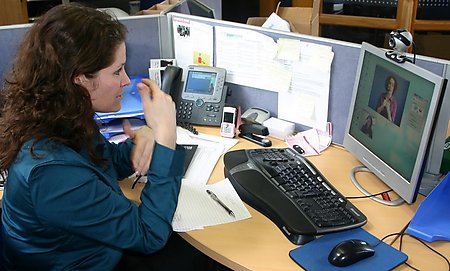News14th May 2015
80% of recruitment consultants ‘could do more’ for disabled jobseekers
If recruiters don't understand the issues involved with disabled recruitment isn't this leading to discriminatory practices
 For those of us who battle to secure jobs because we are Deaf or otherwise disabled, the following Press Release will come as no surprise at all. The disappointment, is not just in the admission that disability recruitment is poor, but also in the fact that such a high percentage of staff involved have so limited knowledge about the definition of disability let alone many oif the issues involved.
For those of us who battle to secure jobs because we are Deaf or otherwise disabled, the following Press Release will come as no surprise at all. The disappointment, is not just in the admission that disability recruitment is poor, but also in the fact that such a high percentage of staff involved have so limited knowledge about the definition of disability let alone many oif the issues involved.
Shockingly, and years after the introduction of Equality legislation in recruitment, this level of ignorance is allowed to continue. Now highlighted once again, I wonder what steps will be taken to address the problem?
Press Release 14 May 2015
Up to 80% of recruitment consultants believe their organisation ‘could do more’ to increase the inclusion of disabled people according to research commissioned by the Recruitment Industry Disability Initiative (RIDI).
 The study also found that almost half (42%) of those surveyed do not have a clear understanding of the definition of ‘disability’ and one in three recruiters (35%) don’t feel confident in their approach to managing applications from disabled candidates.
The study also found that almost half (42%) of those surveyed do not have a clear understanding of the definition of ‘disability’ and one in three recruiters (35%) don’t feel confident in their approach to managing applications from disabled candidates.
Commenting on the survey, Kate Headley, Director of Consulting at the Clear Company and spokesperson for the Recruitment Industry Disability Initiative said:
“Over 18% of working age adults have a disability yet it seems that many hirers could improve their approach to engaging with these jobseekers. It’s encouraging to see that recruiters have recognised the need to enhance their offering to disabled candidates and I hope that this realisation will act as a catalyst for change.

“The fact that almost half of recruiters are unsure about the very definition of disability – that is, a physical or mental impairment that has a ‘substantial’ and ‘long-term’ negative effect on your ability to do normal daily activities – indicates the root of this lack in confidence. Greater understanding surrounding the needs of disabled candidates is integral to improving processes.”
Despite this apparent knowledge gap, the signs are positive that attitudes to disability in the workplace are improving. Almost three quarters (74%) of respondents recognise disabled candidates as an untapped talent pool and two thirds (66%) of those surveyed have made positive changes to their approach to inclusion in recent years.
 Headley continues, “The benefits of truly representative teams are hard to ignore, namely the advantages of having greater access to different perspectives and sources of information. The recruitment profession holds the key to changing perceptions about disability throughout the entire labour market and I’d like to congratulate those organisations taking positive steps to increase the inclusion of disabled people. Small changes in processes can make a huge difference to the disabled candidates’ recruitment experience. Recruiters and employers who would like to do more to increase the inclusion of disabled people should go back to basics and review each stage of the employment cycle from job descriptions to appointment processes – a fresh perspective can often identify barriers which are easy to remove.”
Headley continues, “The benefits of truly representative teams are hard to ignore, namely the advantages of having greater access to different perspectives and sources of information. The recruitment profession holds the key to changing perceptions about disability throughout the entire labour market and I’d like to congratulate those organisations taking positive steps to increase the inclusion of disabled people. Small changes in processes can make a huge difference to the disabled candidates’ recruitment experience. Recruiters and employers who would like to do more to increase the inclusion of disabled people should go back to basics and review each stage of the employment cycle from job descriptions to appointment processes – a fresh perspective can often identify barriers which are easy to remove.”
The Recruitment Industry Disability Initiative (RIDI) is an independent not-for-profit group of employers and recruiters that have come together to drive change for disabled people in the UK jobs market.
Article by Sarah Lawrence, Editor
posted in Community / News
14th May 2015





